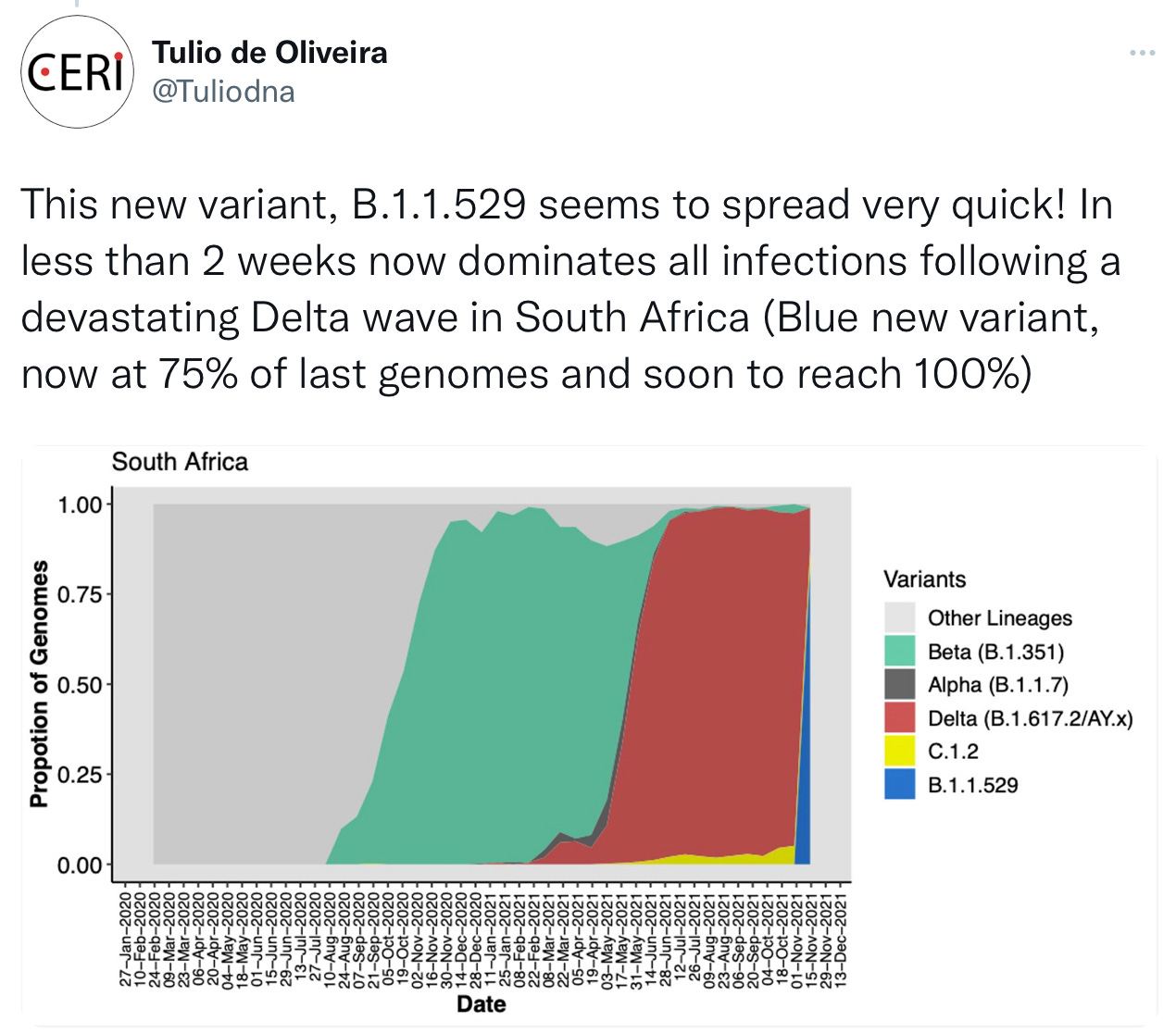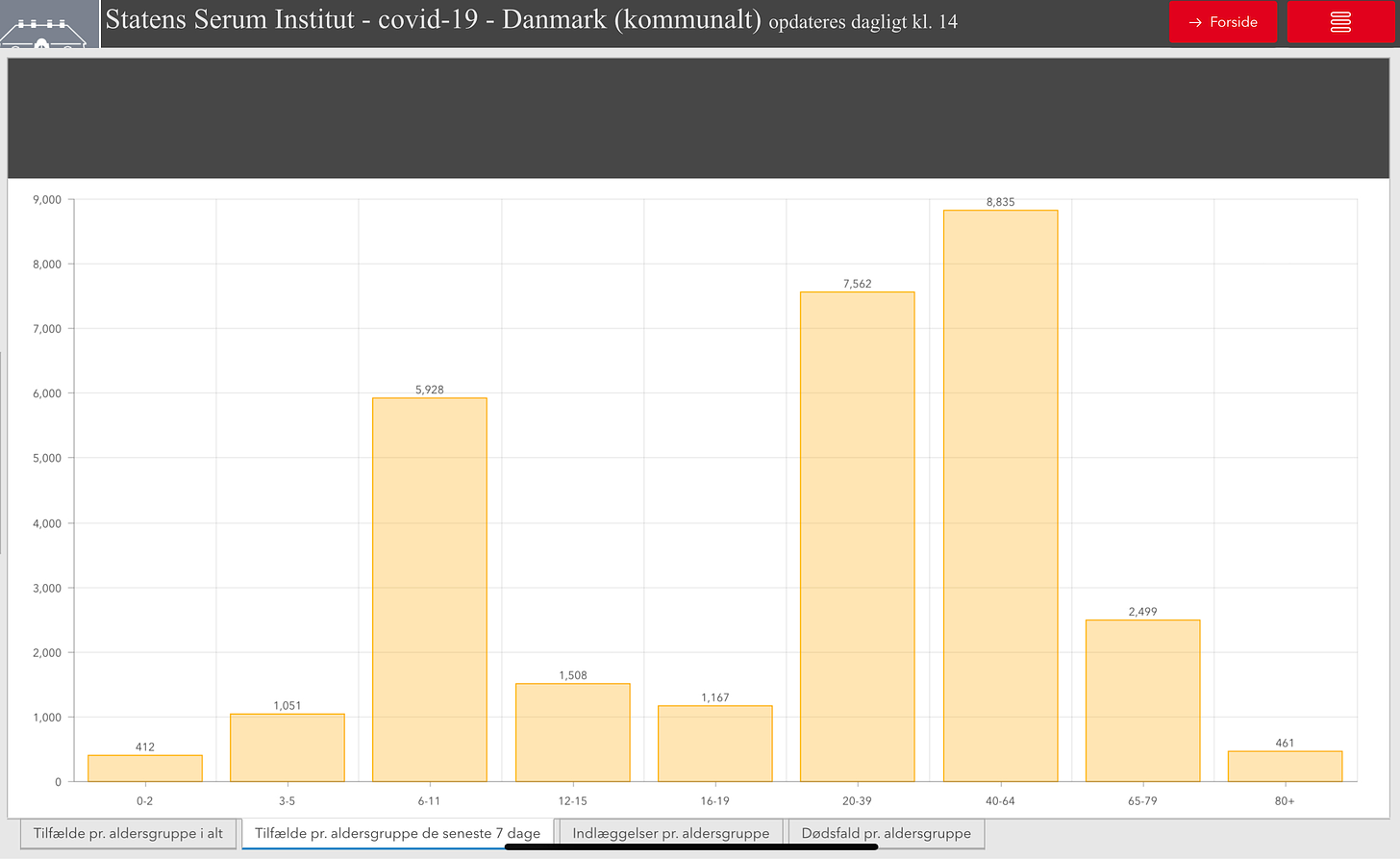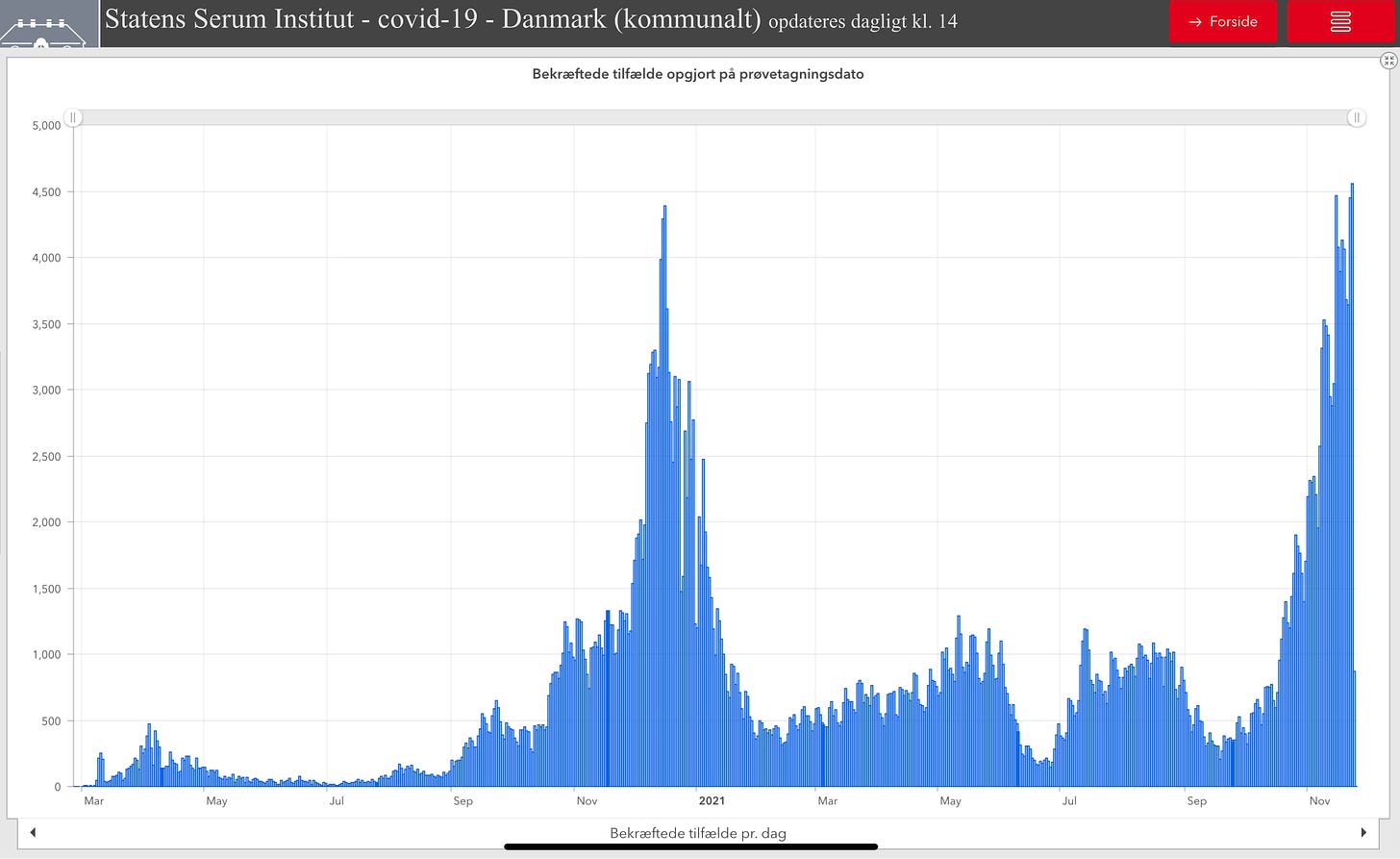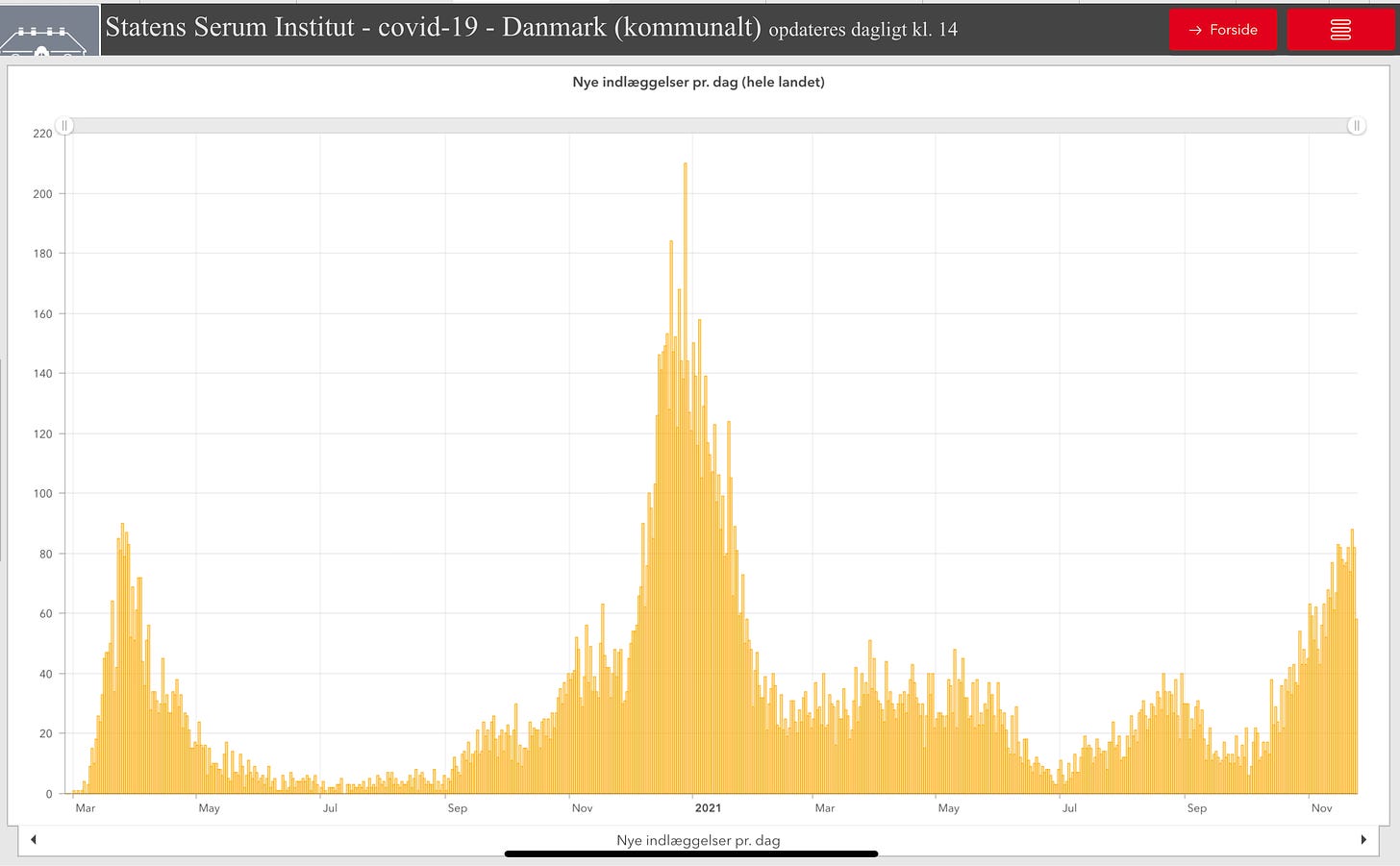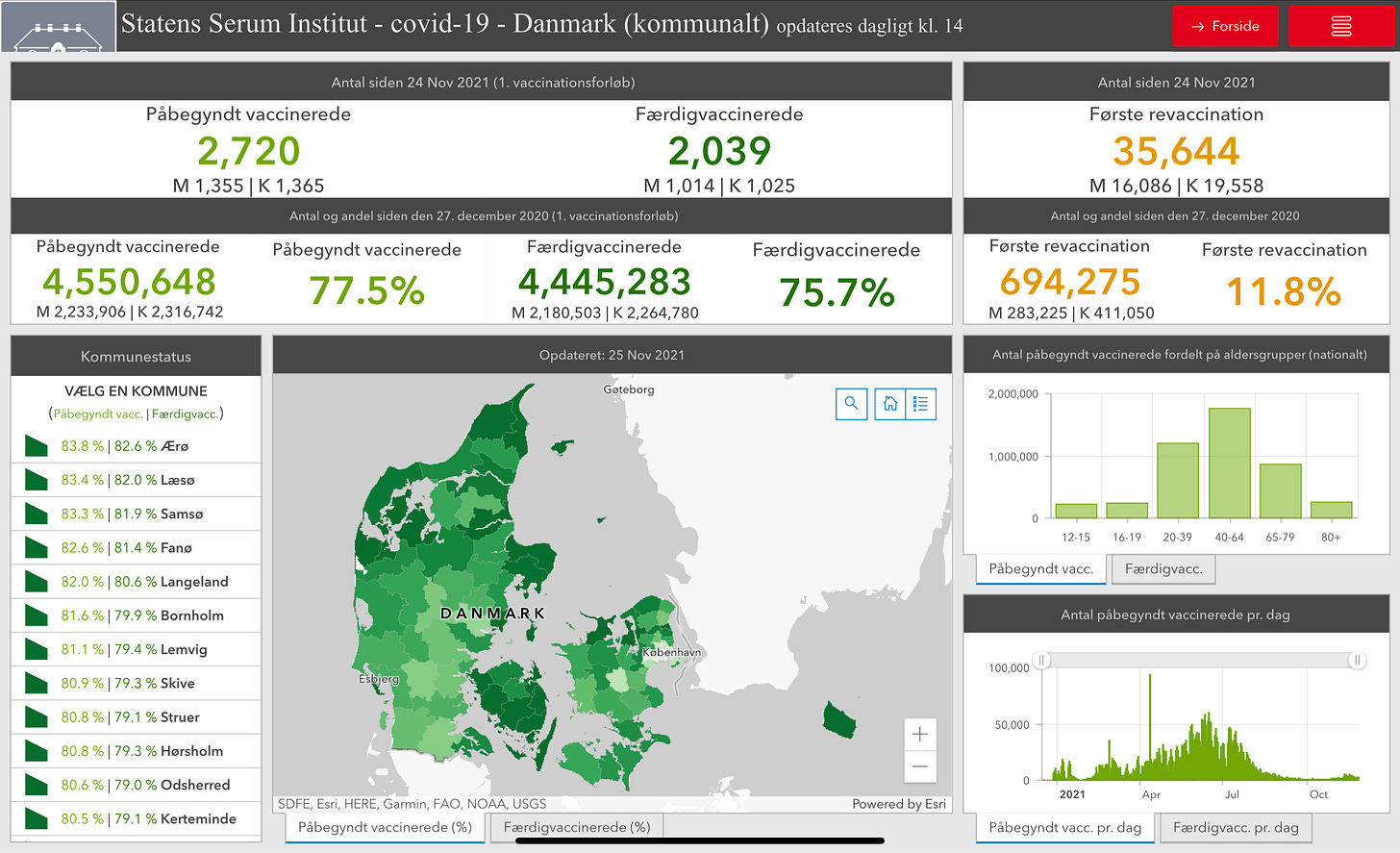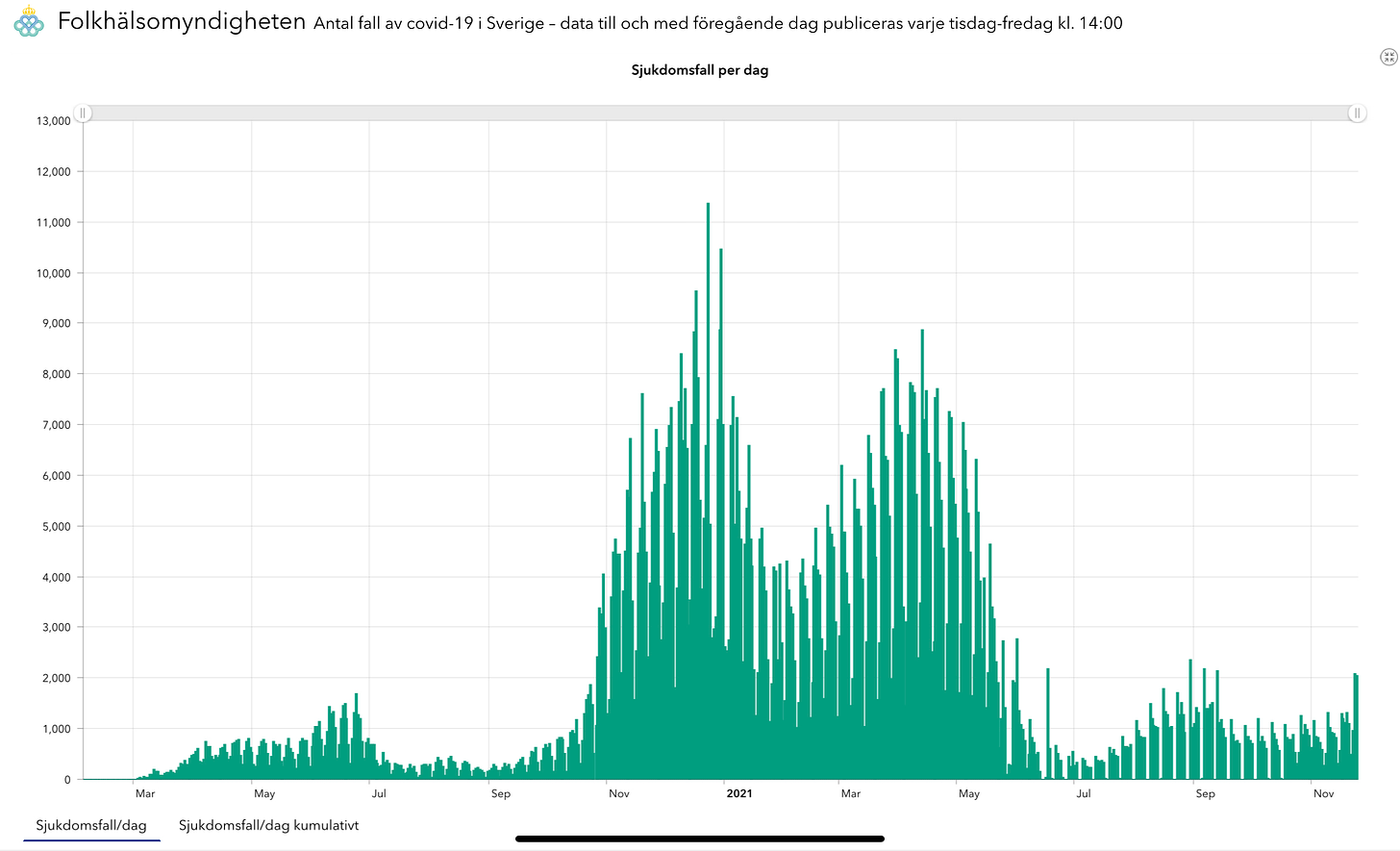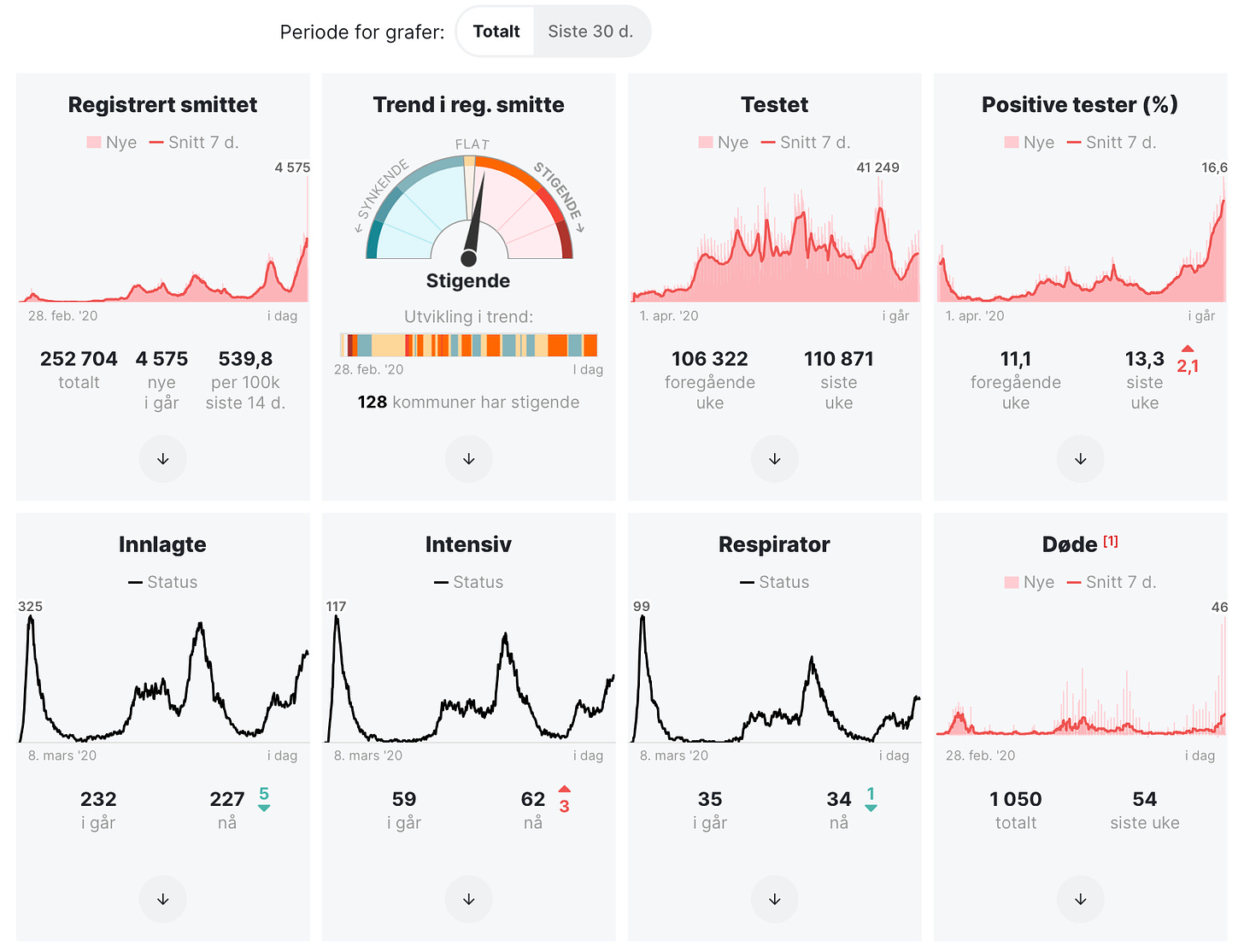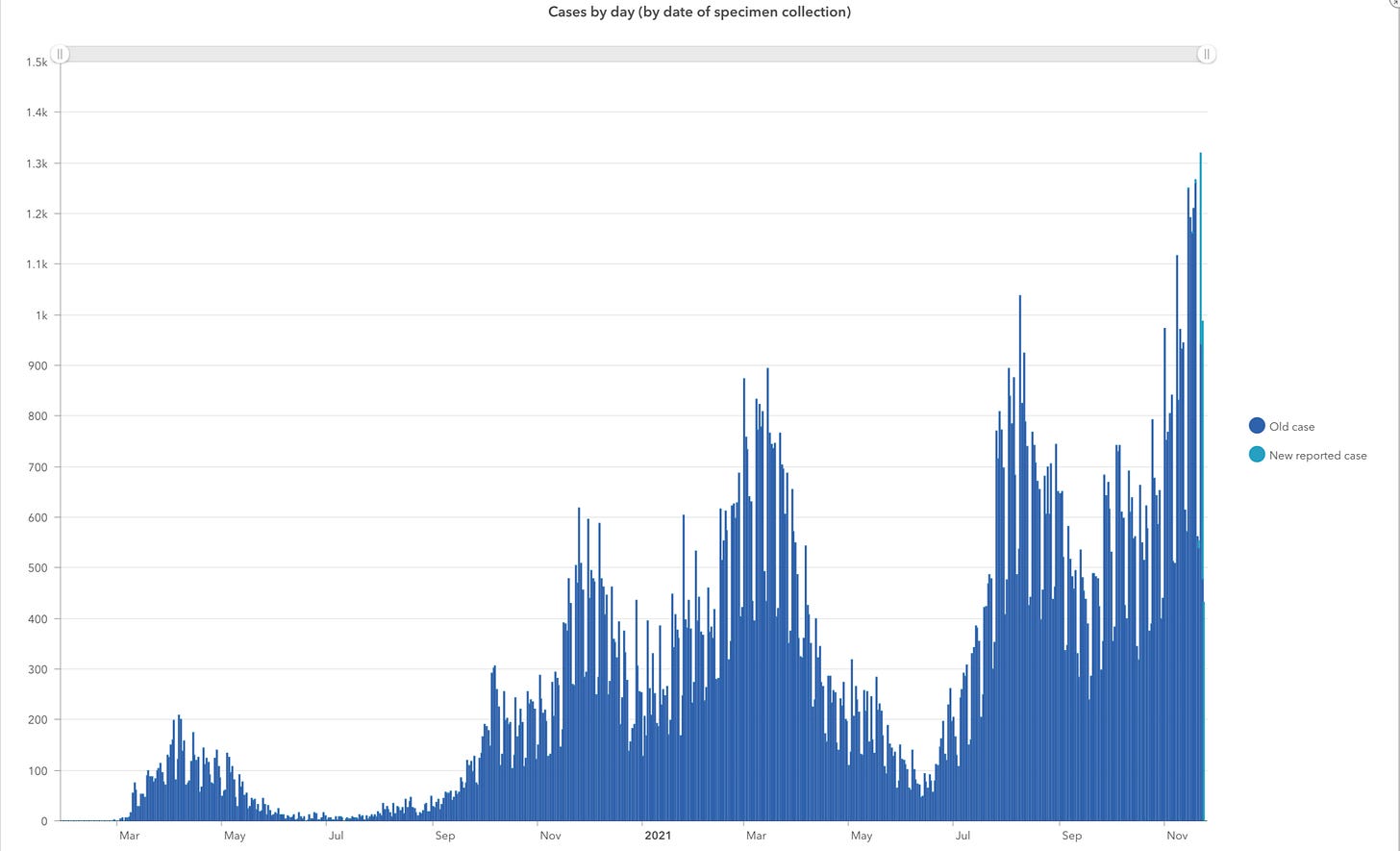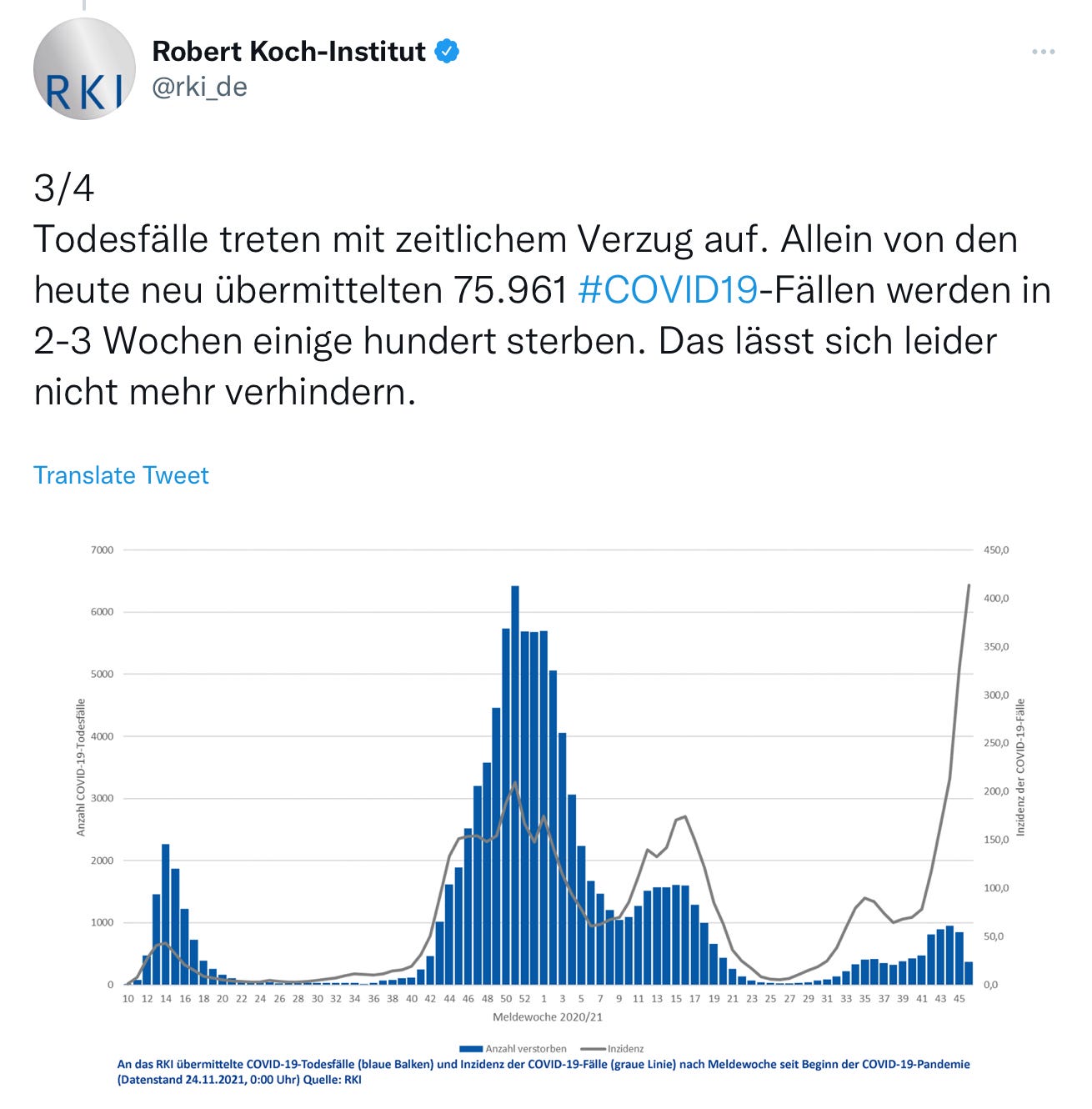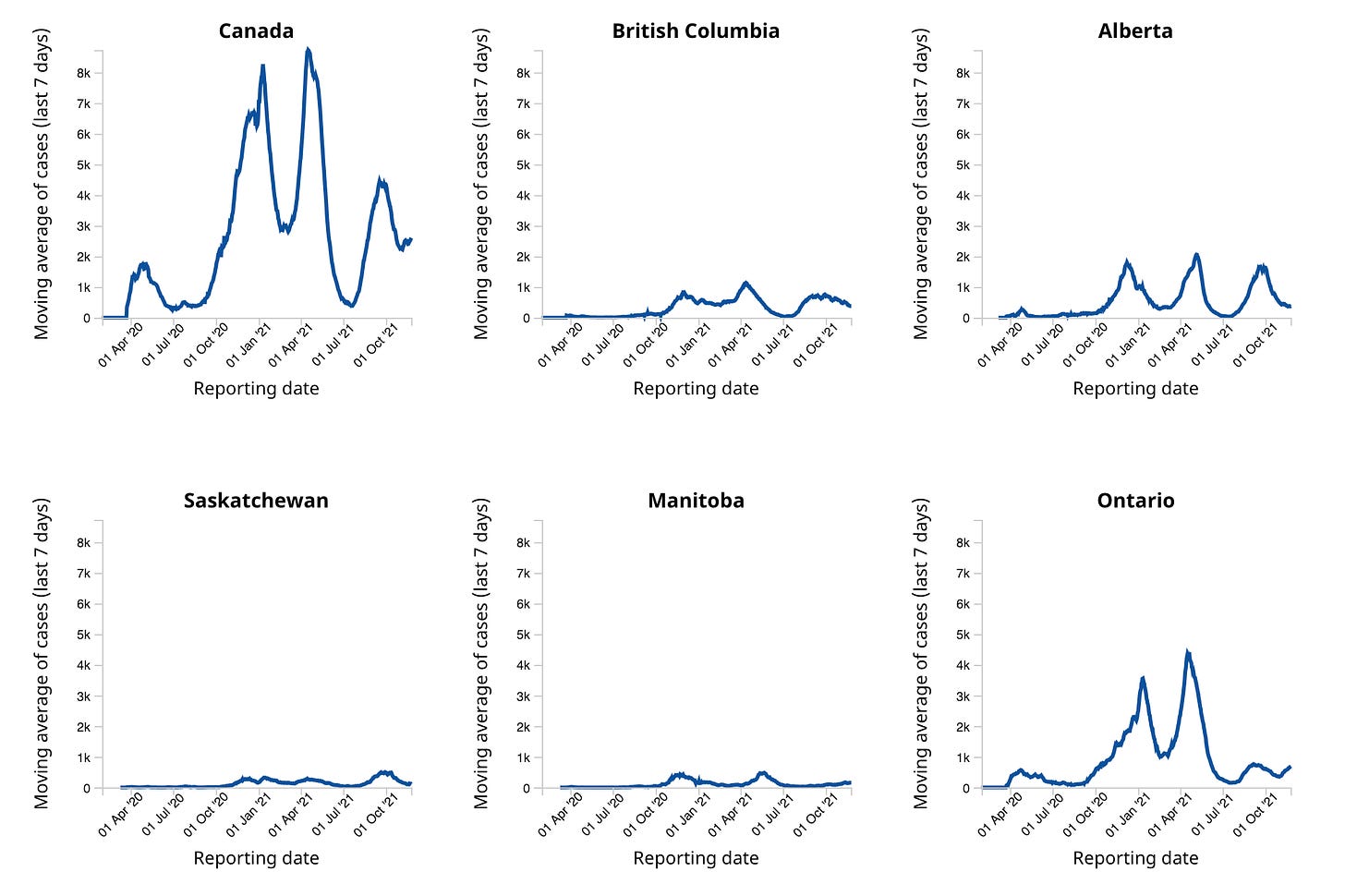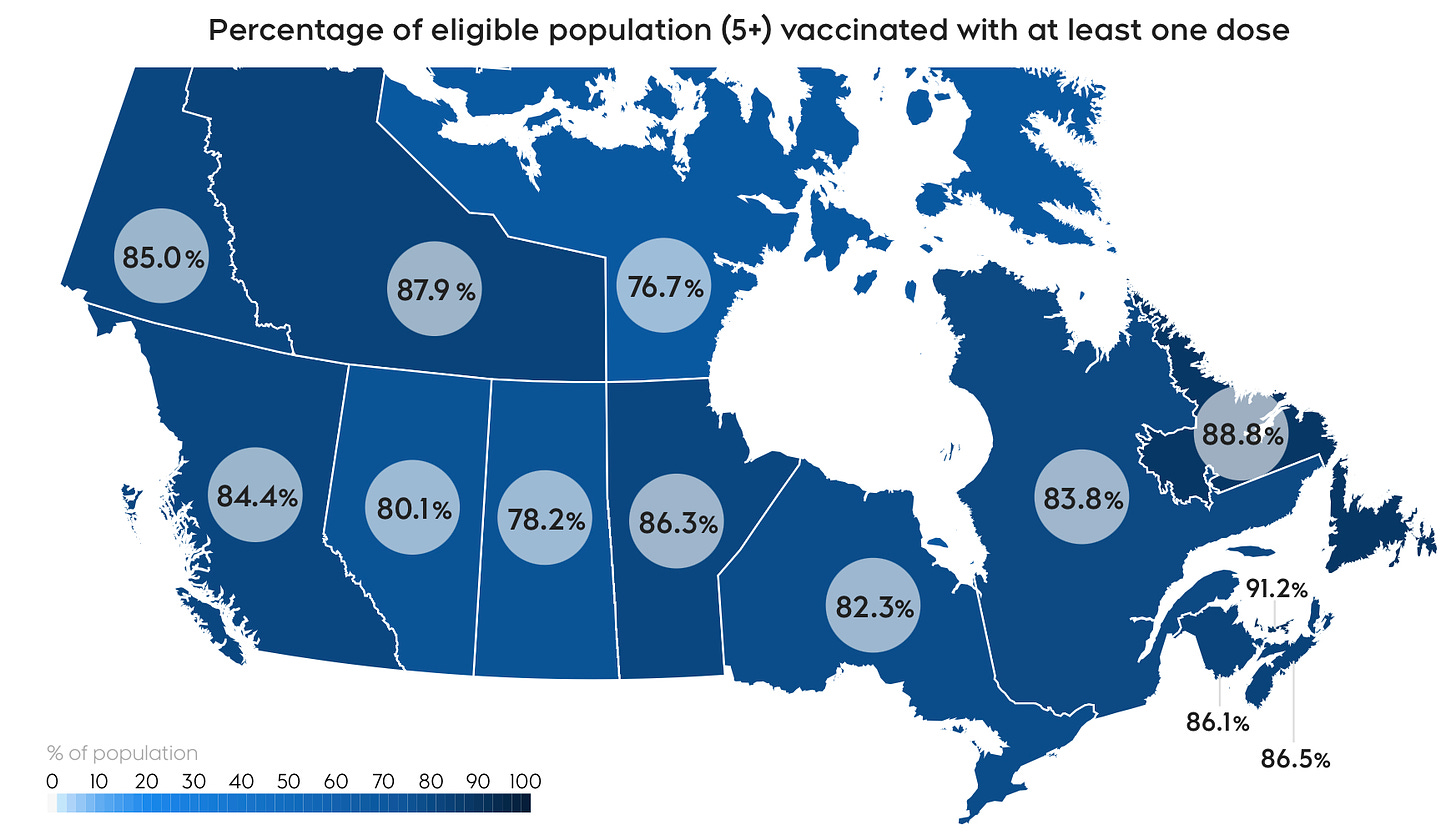The Evening Report - Nov 25
A new variant rears its head and masks will make a return in Denmark
🦠Variant Alert🦠
A new COVID variant has been identified in South Africa, according to scientists in an update held today. The variant, designated B.1.1.529, has a concerning number of mutations, and epidemiologists in South Africa believe it may be behind a surge in infections. COVID cases in South Africa have increased tenfold since November 1. The variant has also been confirmed in Botswana and in Hong Kong due to a returning traveler.
South African Health Minister Joe Phaahla called the variant “a major threat” today. The World Health Organization is also “closely monitoring” the variant to see if it should be included in its list of variants of interest or variants of concern.
In today’s update, South African officials said the variant had ten mutations, which is significantly more than either the Delta or Beta variants.
Researcher Richard Lessells:
“What gives us some concerns [is] that this variant might not just have enhanced transmissibility, so it spreads more efficiently, but might also be able to get around parts of the immune system and the protection we have in our immune system.”
Other scientists in the update added data collected in the coming days and weeks will determine how concerned we should be.
Tulio de Oliveira is the Director of CERI the South Africa Centre for Epidemic Response and Innovation.
University College of London Professor Christina Pagel broke down what we know so far about this concerning new variant in a Twitter thread, which you can find HERE. I will caution like every other variant, it takes time and a whole lot of data to really get a solid understanding of what threat it may or may not pose. That said, the initial signs are not promising.
She notes the variant has been detected in South Africa’s Guateng province, where infection rates have surged in at least part of that province, with the positivity rate skyrocketing from 1% to over 30% in just three weeks.
Pagel says the data we have so far, and there isn’t a ton of it, seems to indicate B.1.1.529 is outpacing the Delta variant, which is not good news.
“The sheer increase on these charts is very worrying and suggests that B.1.1.529 might have significant advantages over Delta and C.1.2. What exactly this advantage is and how it breaks down between immune escape and transmissibility is not yet known. We do know that B.1.1.529 has many more mutations than other variants *and* has mutations seen in other variants that are associated with both higher transmissibility and immune escape.
On Thursday night United Kingdom Health Secretary Sajid Javid said the UK is suspending all travel from six African countries. He says all flights would be suspended from South Africa, Namibia, Lesotho, Eswatini, Zimbabwe, and Botswana from 12:00 GMT Friday.
🇪🇺
On Thursday, the European Medicines Agency officially recommended approval for Pfizer/BioNTech’s application to use a special pediatric dose of its COVID vaccine on five to 11 year olds in Europe. This is one of the last hurdles to beginning a European wide effort to get young children vaccinated. The European Union Commission will now make a final decision based on the EMA’s recommendation then it falls to the different health authorities across EU nations to decide how and when to forge ahead.
🇩🇰
Young children and the unvaccinated are seeing the highest number of new COVID infections as hospitalizations rise and Denmark’s epidemic continues to worsen. That is according to the latest situation report from the Staten Serum Institute.
The report says the COVID incidence rate per 100,000 people reached 1,562 last week among children six to 11 years old. The incidence rate among children has never been this high ever in the pandemic. Among 12 to 15 year olds, the incidence rate was 548, the second highest of any age group.
Ward Doctor Rebecca Legarth:
“The infection among the 6-11-year-olds is helping to drive the epidemic right now, and there are still reports of many large outbreaks in schools.”
The number of new infections increased by 24% in Denmark last week compared to the week before. Hospitalizations are up by 20% with admissions increasing across all age groups. The national positivity rate also rose last week, moving from 2.7% to 3.2%.
The SSI says there continues to be a stark distinction in infection rates between vaccinated and unvaccinated populations. The agency says the data shows that unvaccinated people are three times more likely to get infected and four times more likely to be hospitalized.
“According to our figures, there are currently 32 admissions per 100,000 people among the unvaccinated, against eight per 100,000 among vaccinated people measured on all groups from 12 years old and up.”
The SSI says Metro Copenhagen continues to bear the brunt of this latest infection wave, with a COVID incidence rate more than double anywhere else in the country.
-
In the last two days four schools have either been ordered to close or to send classes home due to out of control COVID outbreaks. The Danish Agency for Patient Safety list says they are Ellebjerg Skole and Lergravsparkens Skole (grades 0-5 sent home) with both being in Copenhagen.
The other two are Den Lille Skole in Gladsaxe Kommune and M.C. Holms Skole in Morsø Kommune, which has been closed entirely. The agency says there were 67 coronavirus infections at the school, with cases jumping around each grade. All 300 students have been sent home for a week.
-
Children across Denmark in grade one and up will get tested for COVID at least once a week at their schools. In a press release, the Danish Health Ministry says a deal has been reached with the group representing local governments to expand the testing regime to include young children. The deal is good until at least March 31 next year.
Health Minister Magnus Heunicke:
“Unfortunately, the infection is significant in schools and spreads among the children. Fortunately, children are rarely hit hard by the virus, but they can still set in motion chains of infection that ultimately hit the elderly and vulnerable citizens of society. Here, screening tests down to 1st grade will be a valuable tool that catches the infection and can help break chains of infection.”
All primary school staff and young students who have not been vaccinated, or who have been infected and recovered within the last six months, are encouraged to get tested once a week. Testing will increase to twice a week if infection activity is high in the district or larger kommune.
The release does not say when this expanded school-based testing effort will officially begin, only saying they “will take a closer look at how self-testing can possibly be implemented in the school area.”
-
People in Denmark will have to mask up again on Monday when they go to the store, get on a train or bus, or if they are visiting a hospital or healthcare facility. Healthcare staff must also mask up at work. The measures were approved by the Danish parliament’s Epidemic Committee on Thursday night.
Committee Chair Stinus Lindgreen spoke to DR:
“What we have agreed on is in relation to public transit, to introduce face masks where you have little choice but to be in a crowded environment. There are also requirements for masks in retail stores, wholesale stores, malls and the like if you are a customer.”
The committee also approved shortening the validity of a negative COVID test. From Monday a negative PCR test will only be valid for 72 hours and a negative rapid test for 48 hours.
-
Legislation giving employers the power to demand their employees show their coronapas to go to work has passed in the Danish parliament. Companies must give reasons for introducing a coronapas requirement. Employees who do not comply can face what the legislation calls “employment law sanctions.”
-
Denmark is reporting 4,390 COVID infections and 12 more coronavirus deaths in the last day.
Based on the testing date, Denmark has set a new record for daily high infections with 4,559 on Tuesday November 23. This marks the second time in a week a new record has been set for the highest number of infections in a single day.
Yesterday there were 343,841 total COVID tests done, of which 183,797 were PCR tests equaling a positivity percentage of 2.39%.
-
According to a report from Berlingske, in a number of cases people have shown up at Danish hospitals with a number of non-COVID issues only to get infected while they are there. Healthcare staff have also been getting infected at work. Berlingske writes that in just one week there have been 19 COVID outbreaks in Danish hospitals. It says the largest outbreak among them resulted in 50 coronavirus infections at Odense University Hospital. The infections were traced back to an acute heart patient at the hospital’s Svendborg ward.
-
COVID hospitalizations (411) have tumbled (-24) while the number of infected people in an ICU (48) declined slightly (-1) and of those the number on a ventilator (23) crept upward (+1).
-
On the vaccination front, there were 40,403 total inoculations yesterday with most (35,644) being booster doses. 2,720 people had their 1st dose yesterday.
To date, 77.5% of the total population has had one vaccine dose, 75.7% have had two, and 11.8% have had a 3rd.
-
The Danish National Health Board is now recommending a booster dose for everyone in Denmark 18 years old and older who is fully vaccinated. The third dose will come six months after a second. People will be invited to book an appointment for a booster in just the same way the original vaccination process worked.
The change is noteworthy because until now health authorities have said the data shows a fading immunity from two doses, mostly in those 40 years old and older, but not so much in younger age groups. Now that has changed.
Deputy Director Helen Probst:
“Since we started the booster shot effort, we have reviewed the latest knowledge and experience in the field. It is now clear that the decline in immunity is also happening for younger people. Against this background, there has also been a shift in perception internationally. There is now increasing professional agreement that re-vaccination is offered at the same interval to everyone over 18 years of age. And when we go out today and offer the 3rd plug to anyone over the age of 18, we are in line with many of the countries we usually compare ourselves with, including Germany, the Netherlands, and Norway.”
Denmark’s national health agency says there is no evidence a 3rd dose causes any new or serious additional side effects. It does say that younger people seem to have a more severe reaction to the usual culprits after a booster dose. Things like pain at the injection site, fatigue, headaches, etc.
Yesterday the European Centre for Disease Prevention and Control adjusted its position on booster doses recommending all EU nations give everyone 18 years old and older a 3rd dose.
-
Region Hovedstaden is getting some help to put the pedal to the metal on its vaccination efforts. The capital region has reached an agreement with a pair of private companies, Practio and Copenhagen Medical, to help get people vaccinated. The two companies will run vaccination pop-up sites to get more people inoculated. The pop-up sites will not require an appointment and will be open for walk-ins. The companies will get to work as of December 2.
-
Region Midtjylland is moving its vaccination sites to appointment only. As of Friday, walk-ins are no longer welcome. The region says it made the move to reduce long line-ups. It is currently hiring more staff to increase vaccination rates and create more booking times for people to take advantage of.
🇸🇪
Sweden has added 2,052 infections and had no new corona deaths since yesterday’s update.
On the Swedish vaccination front:
Population 16 years old and older - 7,305,433 1st vaccine doses (85.5%) and 7,015,719 2nd doses (82.1%) have been administered.
12 to 15 year olds - 241,950 shots given (48.9%)
Booster shots for those 65 years old and older - 781,293 3rd doses administered (35%)
-
In the Swedish municipality of Täby, all new employees hired to work with seniors, psychiatric patients, and children with physical and mental handicaps must be fully vaccinated.
Municipal Board Chair Erik Andersson:
“Older Täby residents and those who belong to the risk group who are in need of the municipality's efforts must be confident that they can get help from vaccinated staff.”
-
The Swedish Public Health Agency has updated its guidelines making changes for what people who live with someone who tests positive should do. The agency now recommends everyone in a home with an infected person stay home and isolate for seven days and get tested for COVID. This applies for everyone in the home regardless of whether they are vaccinated or are, or are not, symptomatic.
Unit Manager Sara Byfors:
“This means that as many chains of infection as possible can be broken early, so that fewer people become ill and less infection is spread in society. Then we also reduce the burden on the healthcare system.”
The seven days of isolation begin on the day the infected person had a COVID test. People who are symptomatic should get a COVID test immediately. For those in the home who do not have any symptoms, they should get a coronavirus test on day five after the infected person’s testing date.
The agency says anyone who has had and recovered from a recent COVID infection within the last six months is exempt and can continue to live their lives.
🇳🇴
Norway has added 5,882 infections and one more virus death since yesterday’s update. It is unclear if this is a record high number of infections detected in a 24 hour period or whether it is a correction from some data problems Norwegian Public Institute of Health had two days ago.
COVID hospitalizations (227) are down (-5) while the number of infected people in an ICU (62) edged up (+3) and of those the number on a ventilator (34) are down (-1).
So far, on the vaccination front 78.5% of Norwegians 12 years old and older have had one vaccine dose, 70.6% have had two doses, and 8.1% have had a booster shot.
-
The Norwegian Institute of Public Health is taking a cautious approach to vaccinating five to 11 years olds after the European Medicines Agency recommended special pediatric Pfizer doses be used in Europe. The institute says it will launch a “thorough study” to determine whether Norway should open the vaccination-program to all young children.
In the meantime, the healthcare agency says it will invite a small group of young children with “serious underlying diseases” to begin the vaccination process.
Chief Physician Margrethe Greve-Isdahl:
“The probability of severe corona infections in children and adolescents is very low. Nevertheless, some children and young people with particularly serious underlying diseases may benefit from a vaccine against COVID. The opportunity will go to a small group of children who already have a serious illness, such as those with cancer, organ transplants, those who have severe immune deficiency, severe and complex neurological diseases, or congenital syndromes. These children can benefit from the protection the vaccine provides.”
The NIPH estimates there are about 3,000 children who would qualify for vaccination. But even then, inoculations won’t begin for a while.
“It will take a few weeks before we have the special pediatric doses in Norway, but as soon as they are available there will be an opportunity for those children who have serious health issues. The vaccine can be an important aid so they can get back to normal everyday life.”
The healthcare agency will now prepare information for the different Norwegian regions, pediatricians, and doctors about which children can be vaccinated first and an overall timeline. It says children will be given two doses of the vaccine “when the practical conditions have been clarified in more detail.”
🇫🇮
Finland registered a record high 1,344 infections today with no new corona deaths.
COVID hospitalizations (306) are unchanged.
So far, 76.1% of the total population has had one vaccine dose, 71.5% have two, and 3.7% have had a booster shot.
-
The Finnish Institute for Public Health says COVID infections are tearing through populations of unvaccinated people and as a result hospitals are in danger of being overwhelmed. COVID hospitalizations have almost doubled in a week going from 155 last week, to 306 this week.
National Vaccination Program Leading Expert Mia Kontio spoke to YLE:
“The number of unvaccinated people in both hospitals and intensive care units is much higher than that of people who have been vaccinated twice.”
According to data from the health institute, the number of unvaccinated patients under the age of 30 is three to four times higher than those who have had both doses.
-
The Finnish Government has extended the Communicable Disease Act until June of next year. The legislation gives the government powers to prevent infectious diseases including levying border restrictions and other actions. On Thursday, Social Services Minister Krista Kiuru announced any restaurant not using a vaccine passport system must stop serving by 5pm and close by 6pm. Eateries using a coronapas system are not impacted. The minister also said that Finnish health authorities are preparing a new vaccination strategy that will include rolling out vaccines to children five to 11 years old.
-
Masks on in Helsinki. The city’s metropolitan area coronavirus coordination group has mandated that everyone 12 years old and older in Metro Helsinki are to wear a mask in public spaces, in stores, and on public transit. The mask mandate will remain in place until at least January 16.
🇩🇪
Germany has absolutely shattered every previous record high number of daily infections as it reported 76,961 new COVID cases and another 315 virus deaths on Thursday. Total to-date coronavirus deaths in Germany now exceed 100,000.
The Robert Koch Institute laments that a great many of these deaths were preventable if people had just gotten vaccinated. The agency says daily deaths in Germany now hover between 200 to 300 and “in a few weeks it will be significantly more.”
“Deaths occur on a delay. Of the 75,961 new COVID cases reported today alone, a few hundred will die in two to three weeks. Unfortunately, this can no longer be prevented.”
🇫🇷
France is recommending everyone 18 years and over get a booster dose of a COVID vaccine. The news was announced at a press conference today by French Health Minister Olivier Veran. France is also reducing the gap between the 2nd and 3rd doses from six months down to five.
🇮🇹
Italy is tightening restrictions and taking direct aim at the unvaccinated as they do it. As of December 6, anyone who is not vaccinated or have recovered from a recent infection will no longer be able to grab a bite inside a restaurant, see a movie, or attend a football game, among many other activities. Italian authorities have essentially removed the negative test component from the coronapas.
🇨🇿
The Czech Republic has declared a COVID state of emergency for at least the next 30 days. By declaring the state of emergency, the Czech government unlocks the power to impose any restrictions it seems necessary to bend the infection curve downward. It has not yet specified what restrictions would be imposed.
🇪🇺
The European Union Commission has adjusted the timeline for how long a person is considered fully vaccinated in its EU COVID digital certificate. The app now deems the holder to be fully vaccinated for a maximum of nine months after getting a second dose. The EU says this is to ensure that people go and get a booster shot as it better reflects the gap between the 2nd dose and when you should get a 3rd.
Denmark has not yet made any changes to its coronapas system, where a person is still considered fully vaccinated for 12 months after getting a second dose.
🇨🇦
Canada reported 2,616 infections on Wednesday while losing another 25 lives to the coronavirus.
On the vaccination effort so far, 30,089,523 1st vaccine doses (78.69% of the total population) have been administered while 28,902,672 people (75.59%) are now fully vaccinated. On the booster dose front, 815,321 3rd doses have been done to date.
In Ontario on Thursday there were 748 new infections, of which 375 were people who were unvaccinated or had just a single dose. There are 275 people in hospital and of those 212 are partially vaccinated or not vaccinated at all. Of the 137 in an ICU, that number is 126.
Quebec reported 902 COVID cases and five more deaths. This is the first time since September 11 that daily infections have exceeded 900 in the province.
In Atlantic Canada, New Brunswick recorded 95 new infections. Nova Scotia had 22 cases and one death. Newfoundland and Labrador had four.
Manitoba saw 183 new infections and five more fatalities.
There were 96 infections and one more death in Saskatchewan.
Alberta registered 379 new corona cases and one more death. There are 367 people in hospital, of which 70.1% are unvaccinated or have one dose. Of the additional 98 in an ICU, that number is 84.7%
B.C. logged 424 infections and three deaths on Thursday. There are 295 people in hospital and 112 in intensive care.




